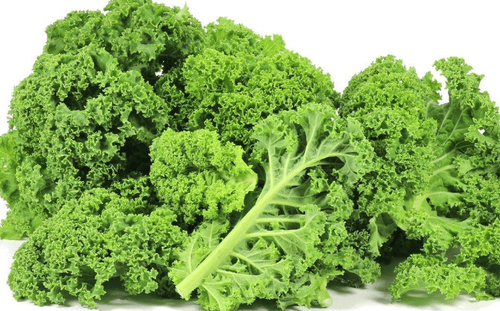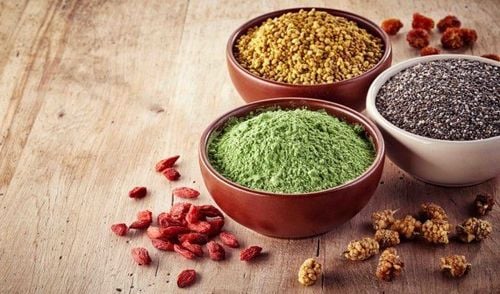This is an automatically translated article.
Green vegetable juices are one of the biggest health and wellness trends of the last decade. Some people claim that this drink brings a lot of health benefits such as vegetable juice to purify the body, lose weight and boost immunity.1. What is green vegetable juice?
Green vegetable juice is a beverage made from the juice of green vegetables. There's no official recipe, but common ingredients include celery, kale, chard, spinach, wheatgrass, cucumber, parsley, and mint.
Green juice has a bitter taste, most recipes add a small amount of fruit so it may or may not be green to sweeten and make it more palatable. Popular fruit choices include apples, berries, kiwi, lemons, oranges, and grapefruit.
People who often drink green juice prefer homemade fresh juice, but you can also buy it from juice shops.
Commercially packaged green juices are also available, but some of these products contain sugar, which reduces the nutritional density of the drink. Excess sugar intake has also been linked to a number of harmful side effects.
Furthermore, many bottled green juices are pasteurized. This process heats the juice to kill harmful bacteria and extend its shelf life, but it can damage some of the heat-sensitive nutrients and plant compounds found in the fresh greens.
2. Health benefits of green vegetable juice

Nước ép cải xoăn có chứa vitamin A và K
Vegetable juices are no substitute for a healthy and balanced diet, but they can provide many benefits when you eat more fruits and vegetables.
Green vegetables and juices are excellent sources of several vitamins, minerals and beneficial plant compounds. For example, kale and kale contain vitamins A and K, while wheatgrass provides plenty of vitamin C and iron.
Research shows that eating green vegetables daily can help reduce inflammation, lower your risk of heart disease, and reduce your risk of age-related mental illnesses.
There is also evidence that certain compounds in fresh juices can act as prebiotics, serve as food and aid in the growth of beneficial bacteria that live in your digestive tract. friend.
Regular intake of prebiotics has been linked to many benefits, including reduced constipation, weight maintenance and improved immune function.
Furthermore, many people find that drinking vegetables and fruits is an easy and effective way to increase their intake of precious nutrients.
Finally, some people, such as those who have had stomach or intestinal surgery, may benefit from green vegetable juice because it is easier to digest.
3. Disadvantages of green vegetable juice

Nhược điểm của nước ép rau xanh là sẽ loại bỏ phần lớn chất xơ của các thực phẩm đó
While drinking green juice is a great way to increase your intake of many important nutrients, there are some downsides you should consider before using.
Low fiber Fruit or vegetable juices will remove most of the fiber from these foods. Fiber is very important to a healthy diet. Adequate fiber intake will support heart health by helping to control blood pressure, blood sugar and cholesterol levels. It can also relieve some digestive disorders, such as acid reflux, diverticulitis, and intestinal ulcers.
The American Institute of Medicine recommends eating 25 grams per day for women and 38 grams for men.
Green vegetable juice does not contain much fiber, so it should not be used as a substitute for your daily intake of green vegetables or fruit.
If you are considering adding green vegetable juice to your health regimen, don't forget to eat lots of vegetables and fruits.
May raise blood sugar If you have diabetes or another medical condition that causes poor blood sugar control, juices may not be the best choice for you.
These drinks tend to be low in fiber and protein, two nutrients that aid in blood sugar balance.

Trường hợp bị bệnh tiểu đường Có thể làm tăng lượng đường trong máu
Green vegetable juices are made with only vegetables that are lower in carbs and are unlikely to negatively affect your blood sugar. However, if you prefer green juice with fruit, the sugar in the fruit can contribute to your blood sugar spike.
You can minimize this side effect by combining the juice with a meal or snack that provides fiber and protein, such as flaxseed crackers with cottage cheese, veggies with tuna salad, or oatmeal buckwheat with unsweetened vegetable milk and almond butter.
You should be especially wary of pre-packaged green juices, as these can often contain added sugar. You can check the product label and make sure that the fruit or vegetable is the only ingredient.
May be harmful to the kidneys Drinking blueberry juice in moderation can increase nutrient intake, but too much can cause serious side effects.
Green vegetables are a rich source of oxalic acid or oxalate, which is considered an antinutrient because it binds to minerals in foods and prevents the digestive tract from absorbing minerals.
The amount of oxalate from whole vegetables in a balanced diet is not harmful. However, green vegetable juices tend to be concentrated sources of oxalates. Too much oxalate can lead to negative health effects, including kidney stones and even kidney failure.
If you plan to use green juice in your diet, use it in moderation and eat well-balanced meals that include a variety of foods.

Nước ép rau xanh có quá nhiều oxalat có thể dẫn đến suy thận
4. When should you drink vegetable juice?
There are currently no official recommendations for how much green juice you should drink. However, you need to be aware that green juice can be a nutritious part of your diet, as long as you drink it in moderation and don't use it to replace whole vegetables and fruits.
For prepackaged varieties, just be sure to read food labels, as they may contain added sugar. If you have diabetes or other blood sugar problems, you should limit your use of products that contain only vegetables.
Please dial HOTLINE for more information or register for an appointment HERE. Download MyVinmec app to make appointments faster and to manage your bookings easily.
Article referenced source: healthline.com












